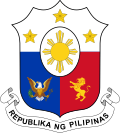| Term started | Representative from the Integrated Bar | Representative from the academe | Retired Supreme Court justice | Representative from the private sector | Appointed by |
|---|
| December 10, 1987 | Leon Garcia Jr. - June 17, 1988 – July 9, 1991
| Rodolfo Palma - December 10, 1987 – July 9, 1990
| Nestor Alampay - December 10, 1987 – December 10, 1989
| Ofelia Santos - December 10, 1987 – December 10, 1988
| Corazon Aquino February 25, 1986 – June 30,. 1992
|
| December 10, 1988 | Ofelia Santos - December 10, 1988 – July 9, 1992
|
| December 10, 1989 | Lorenzo Relova - January 8, 1990 – July 9. 1993
|
| July 9, 1990 | Rodolfo Palma - July 9, 1990 – July 9, 1994
|
| July 9, 1991 | Presbitero Velasco Jr. - January 7, 1993 – March 22, 1995 a
|
| July 9, 1992 | Teresita Cruz Sison - September 30, 1992– July 9, 1996
| Fidel V. Ramos June 30, 1992 – June 30, 1998
|
| July 9, 1993 | Jose C. Campos - September 22, 1993 – July 9. 1997
|
| July 9, 1994 | Cezar Peralejo - February 8, 1995 – July 9, 1998
|
| July 9, 1995 | Francisco Santiago - August 1, 1995 – July 9, 1996
Amado Dimayuga - July 8, 1997 – July 9, 1999
|
| July 9, 1996 | Teresita Cruz Sison - July 9. 1997 – July 9, 2000
|
| July 9, 1997 | Regino C. Hermosisima Jr. - November 24, 1997 – July 9. 2001
|
| July 9, 1998 | Alfredo Marigomen - July 21, 1998 – July 9, 2002
| Joseph Estrada June 30, 1998 – January 20, 2001
|
| July 9, 1999 | Amado Dimayuga - July 9, 1999 – July 9, 2003
|
| July 9, 2000 | Teresita Cruz Sison - August 18, 2000 – July 9, 2004
|
| July 9, 2001 | Regino C. Hermosisima Jr. - September 10, 2001 – July 9, 2005
| Gloria Macapagal Arroyo January 20, 2001 – June 30, 2010
|
| July 9, 2002 | Amado Dimayuga - July 9, 2003 – July 9, 2006
|
| July 9, 2003 | Conrado Castro - July 9, 2003 – July 9, 2007
|
| July 9, 2004 | Raoul Victorino - July 12, 2005 – July 9, 2008
|
| July 9, 2005 | Regino C. Hermosisima Jr. - October 4, 2005 – July 9. 2009
|
| July 9, 2006 | Amado Dimayuga - July 9, 2006 – July 9, 2010
|
| July 9, 2007 | Conrado Castro - July 9, 2007 – March 17, 2011 b
Maria Milagros Fernan-Cayosa - May 2 – July 9, 2011
|
| July 9, 2008 | Aurora Santiago Lagman - October 13, 2008 – July 9, 2012
|
| July 9, 2009 | Regino C. Hermosisima Jr. - July 9, 2009 – July 9. 2013
|
| July 9, 2010 | Jose Mejia - April 28, 2011 – July 9, 2014
| Benigno Aquino III June 30, 2010 – June 30, 2016
|
| July 9, 2011 | Maria Milagros Fernan-Cayosa - July 9, 2011 – July 9, 2015
|
| July 9, 2012 | Aurora Santiago Lagman - July 9, 2012 – July 9, 2016
|
| July 9, 2013 | Angelina Sandoval-Gutierrez - October 8, 2014 – July 9. 2017
|
| July 9, 2014 | Jose Mejia - July 9, 2014 – July 9, 2018
|
| July 9, 2015 | Maria Milagros Fernan-Cayosa - July 9, 2015 – July 9, 2019
|
| July 9, 2016 | Toribio Ilao Jr. - October 24, 2016 – July 9, 2020
| Rodrigo Duterte June 30, 2016 – June 30, 2022
|
| July 9, 2017 | Jose C. Mendoza - October 4, 2017 – July 9. 2021
|
| July 9, 2018 | Noel Tijam - March 6, 2019 – July 9, 2022
|
| July 9, 2019 | Franklin Demonteverde - July 9, 2019 – July 9, 2023
|
| July 9, 2020 | Toribio Ilao Jr. - July 9, 2020 – July 9, 2024
|
| July 9, 2021 | Jose C. Mendoza - July 20, 2021 – July 9, 2025
|
| July 9, 2022 | Nesauro Firme - July 11, 2022 – present (Term ends July 9, 2026)
| Bongbong Marcos June 30, 2022 – present
|
| July 9, 2023 | Erlinda Piñera Uy - July 21, 2023 – present (Term ends July 9, 2027)
|
| July 9, 2024 | Jose Mejia - July 20, 2024 – present (Term ends July 9, 2028)
|
| July 9, 2025 | Jose C. Mendoza - July 25, 2025 – present (Term ends July 9, 2029)
|





